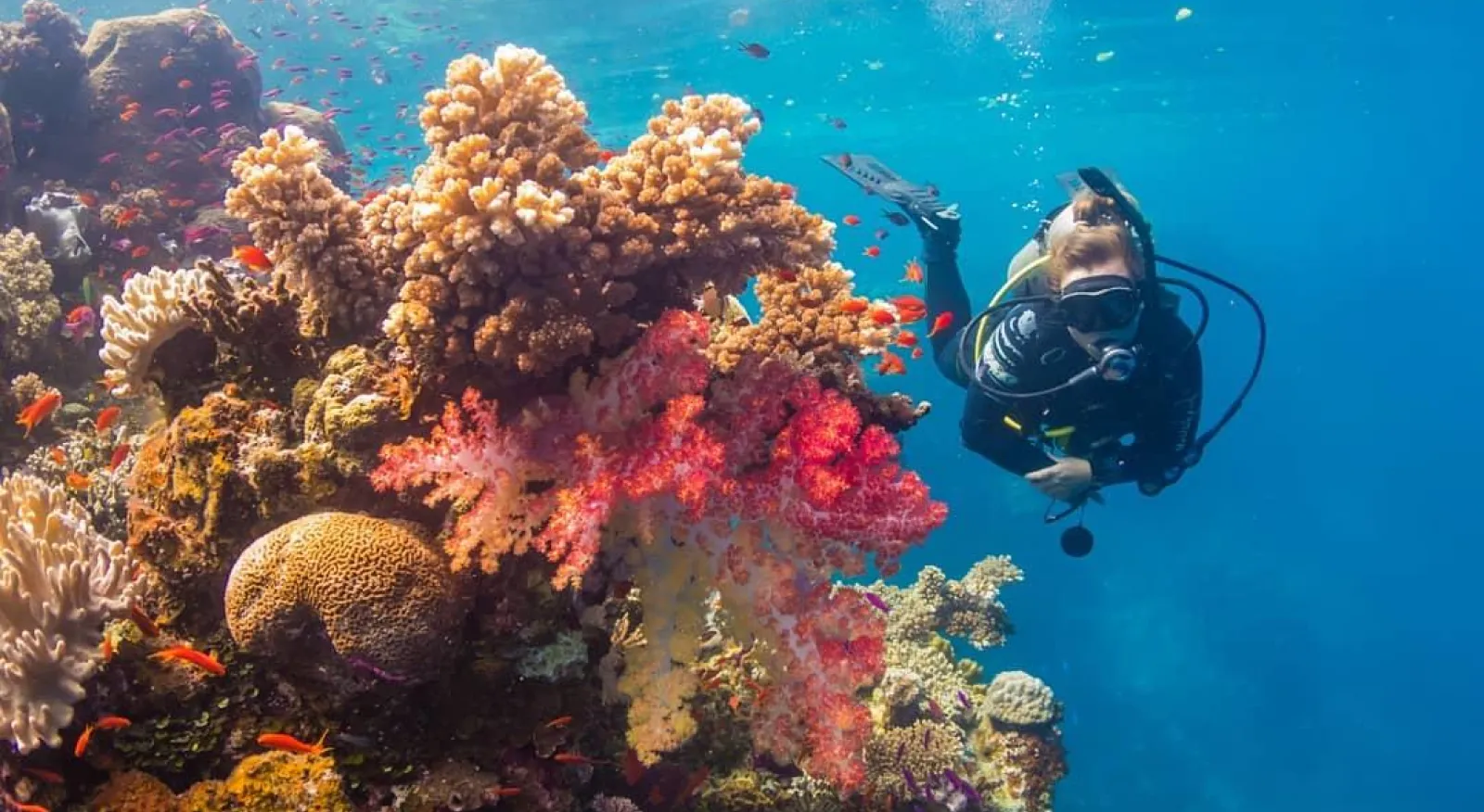Conserving coral reefs in Fiji
How communities in Fiji’s north are building climate resilience and protecting natural resources by restoring coral reefs.

Pacific Islanders have contributed the least to global climate change*, yet the Pacific Islands are experiencing the brunt of direct impacts. The region is regularly affected by temperature variability, storm surges, changes in rainfall patterns, sea level rise and coral bleaching, all of which threaten biodiversity and ecosystems.
Fiji, known as the heart of the tropical South Pacific, is one Pacific Island country disproportionately affected by climate change.
Working hard to combat the impacts of climate change and protect Fiji’s natural environment is program partner, the Savusavu Tourism Association (STA). STA is a community organisation that supports small businesses, tour operators and accommodation providers by promoting tourism to Savusavu, a hidden paradise in Fiji’s north.
‘STA is part of the Savusavu Blue Town committee, which is a model for sustainable growth aiming to improve the town’s environmental health,’ says Delia Rothnie-Jones, STA chairperson.
‘Tourists are increasingly concerned about the impact they’re having on the planet and want to know that the places they visit are working to minimise their carbon footprint and adhere to sustainable practices. STA members are constantly looking for ways to do this. STA is also looking at ways to involve the local villages directly in tourism, so locals become partners in the development of tours.’
Rehabilitating coral reefs
Fiji is home to some of the most colourful coral reefs and diverse marine life in the world.
In Savusavu’s Natewa Bay, coral reefs are suffering from climate-change related degradation, including damage caused by rising sea surface temperatures and the increasing frequency and severity of storms. Climate change-related heat stress also damages reef-building corals, which leads to the collapse of the reef ecosystems that support marine life and fisheries.
Without intervention, damaged coral reefs could deteriorate completely, which is not only devastating for local marine life but also for the local communities who rely on the reefs for their livelihoods.
With the support of an Impact Fund grant from the Australian Volunteers Program, STA and Ocean Ventures, a PADI-dive centre and STA member, are working to tackle reef degradation and build climate change resilience through coral restoration. This includes rehabilitating degraded reefs and establishing coral nurseries, allowing coral communities to re-establish and eventually flourish.
Ocean Ventures kicked off the coral conservation project in April 2021 with the installation of two coral nurseries in Natewa Bay. With the funding from the program, a further eight nurseries were installed at four reefs, also in Natewa Bay. Corals damaged by Tropical Cyclone Yasa were selected and gathered by a team of coral gardeners, who placed them in rope nurseries during the cooler months of July to October.
‘Following Tropical Cyclone Yasa, we noticed that many of the shallow reefs in Natewa Bay had suffered substantial damage due to the strong winds and associated storm surge when the eye of the storm passed over the island of Vanua Levu,’ says Matthew Norman, who along with his partner Sara Carlson, co-founded Ocean Ventures in 2016.
‘Although we know that coral reefs will regenerate naturally over time if given the opportunity, we decided to start a series of coral nurseries to give the reefs a helping hand. Corals need a stable base to which they can anchor and grow; and loose coral rubble will eventually die. But by selecting loose coral fragments broken by the cyclones and placing them in rope nurseries, they have a chance to grow.’
‘Since installing the coral nurseries, we’ve been monitoring their progress, cleaning the ropes every few weeks to ensure they’re free of algae that might smother the corals, and periodically tightening the ropes as the corals grow in size and weight,’ says Matthew.
‘So far, the vast majority of the corals are doing really well and look healthy. They’ll stay in the ropes being closely monitored during the warmer months of cyclone season, and then when the water starts to cool in April or May of this year, they should be ready to be replanted onto the reef.’
‘As these corals are replanted on the reef, new coral fragments will be selected and placed in the rope nurseries for the upcoming season. In this way, the coral planting will be an ongoing project helping to improve coral cover on the reefs, as well as food security for local communities who rely on their reefs for sustenance.’
A community effort
The overall goal of the project is to replant 3,000-4,000 corals back onto the damaged reefs towards the end of 2022.
‘It’s an ongoing project; as grown corals are planted back onto the reef, the nursery ropes will be repopulated with new coral fragments,’ explains Matthew, who highlights the involvement of local communities as an integral part of the project.
'Members of local communities are involved with the maintenance of the coral nurseries, helping to protect their marine resources and food security for future generations.'
'People from local villages have helped install and maintain the nurseries and have been trained in basic coral restoration techniques. We’ve attended village meetings where we’ve been able to show videos about the conservation work, which has given local communities a real sense of what the project is all about.’
One local community has designated a significant area of their reef as 'tabu', an area where fishing is prohibited. Within just a few weeks locals noticed that the size of the fish seen close to the village had increased. Not only is this good news from a sustainability perspective, it’s proof that the project is helping foster greater interest in protecting local marine life and adopting sustainable management of natural resources.